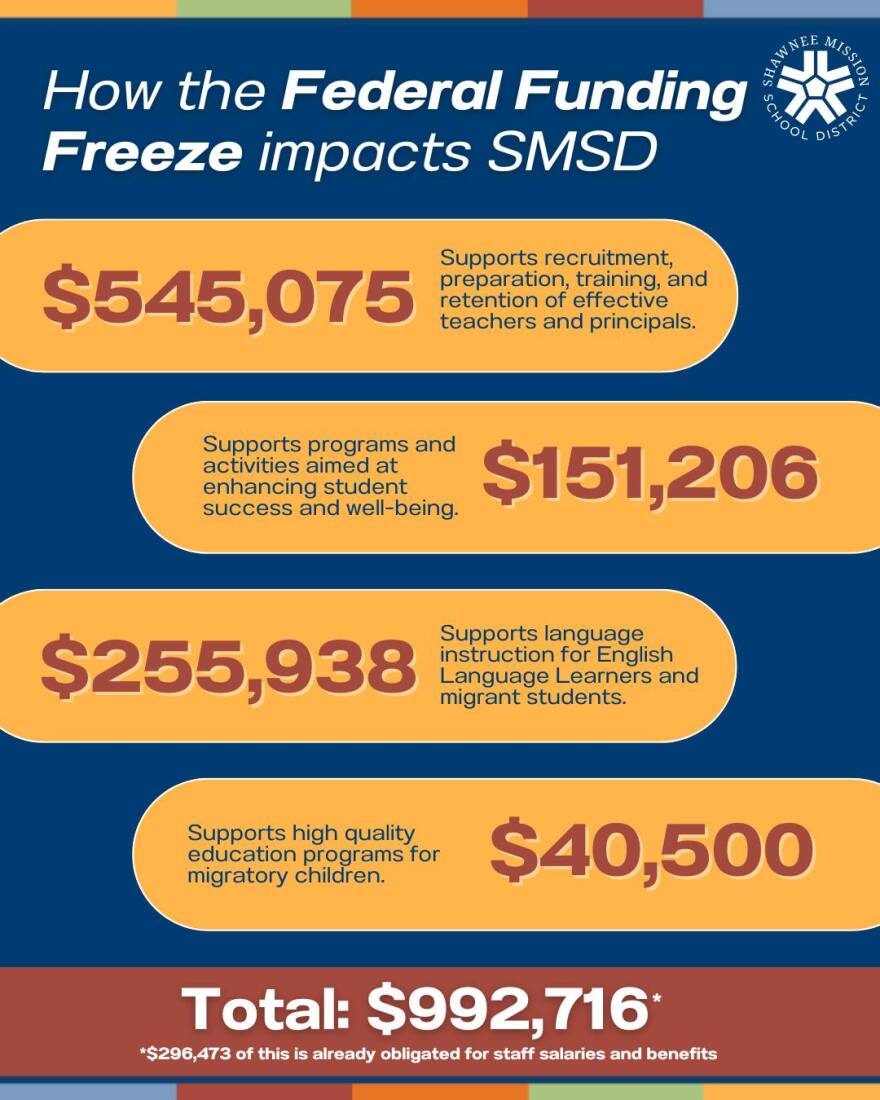Elizabeth Ault teaches English as a second language to high schoolers in the Shawnee Mission School District. For her students, she said learning a new language is like going to a job interview every day — or even every hour.
“You don't know what's going to happen. You don't know the questions that are going to be asked,” Ault said. “You don't know how you should behave or how you should act in class.”
That stress-inducing experience is why she believes professional development and training for teachers is critical to helping students learning English feel more comfortable and be successful in the classroom.
That training is often funded by Title III federal grants, which school districts receive to support students who don’t speak English as their native language. Schools are federally required to ensure those students have equal access to education.
But Title III funding was part of the nearly $7 billion in federal grants withheld by the Trump administration earlier this month, just before school districts anticipated receiving that money.
Those funds were already congressionally approved for schools to use on a range of services to support English language learners including buying curriculum, implementing new programs and hiring and training staff.
Ault said the lack of funding will be like “an ache” for school districts that she compares to a pebble stuck in a shoe and that schools won’t feel — at first.
“Then you're not going to get out of it, because there's other funding needs and other places, and some districts can afford to fill in that money that's missing, some districts can't,” Ault said. “What is that going to be like? And that's the part that's scary.”
Schools' most vulnerable students
Kansas City area school districts sounded the alarm earlier this month, saying the Trump administration’s decision could have immediate effects.
Kansas City Public Schools officials said they could lose $797,086 allocated for English language learners and immigrant students. Kansas City, Kansas, Public Schools would lose $854,864.

The Shawnee Mission School District stands to lose $255,938 in federal grants supporting instruction for English language learners and migrant students.
A Shawnee Mission spokesperson said Title III funding impacts the district’s most vulnerable students who rely on school for a successful future.
“We are not going to cease providing those students with everything they need to be successful in life just because someone in Washington, either responding to unfounded rumors or out of pure malice towards marginalized groups of people, decides to ignore their legal obligation and withhold funding from local school districts,” the spokesperson said.
“That is not, and will never be, who we are. I suspect the people in Washington making these decisions know that.”
Dr. Michael Schumacher, the Shawnee Mission superintendent, said they’d been planning for months how to spend their share of federal grants and had already made commitments — including nearly $300,000 in contracts for staff salary and benefits.
He said the services funded through these programs are critical for students.
“Thus, our only option is to immediately begin planning to shift local funds from other uses, in order to cover these shortfalls,” Schumacher said. “This has the potential to negatively impact every student in the Shawnee Mission School District.”
Because of Title III funding, Ault said she was able to be trained and certified to teach English as a second language. She said the funds have also paid for professional development so she could create "instructional coaches."
Ault said coaches “help teachers become better teachers” by giving them access to research-based strategies and practices. Her district has a full-time instructional coach who helps teachers adapt their classrooms to better benefit English language learners.
Those methods include the Sheltered Instruction Observation Protocol, which helps teachers plan lessons so English learners can study the same curriculum as native speakers in the same grade.
“Really, having this training kind of lowers this filter that students feel more comfortable in class, more comfortable in that space,” Ault said. “School is still a little stressful, but it's not as stressful.”
There are also experiences outside of the classroom that Title III funding covers, Ault said, such as after-school care where students can learn English. School social workers and counselors can also receive training to better work with families of English language learners.

Access to a 'fair education'
If the Trump administration continues to withhold these funds, Ault said children will suffer the most.
“They will not have access to fair education,” Ault said. “They won't have access to the (education) legally required by Castaneda, by Lau, by Plyer — all of those Supreme Court cases say that any child who's in the United States should go to school, should have a research-based education, and that students who are English language learners need access to programs to support them.”
The U.S. Department of Education said it would not disburse the money to states until it reviewed several federal grants. But there's no timeline for when that would be, and two dozen states are now suing the Trump administration over the funding freeze.
The department released $1.3 billion in withheld grant money for after-school programs last week, but it’s not clear if or when the rest of the federal grants would be disbursed. The administration's proposed budget for next year eliminates all of the frozen grants.
Some schools and organizations across the country have already cut roles and programs because of the uncertainty for their budgets.
Education advocates anticipate rural schools will be hit the hardest because they already have to compete with larger districts over limited federal funding and struggle to find staff with credentials to teach English as a second language.
Ault said many teachers are walking on eggshells in the meantime, unsure if their roles or programs will be cut. But Ault said she appreciates schools being transparent about where and how federal funds are being used.
“It's going into the foundation of the schools,” Ault said. “It's going into the systems that the schools use to benefit everybody, not just a certain group of students.”








